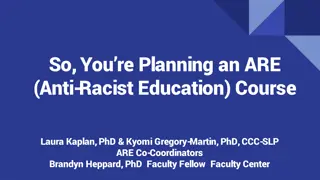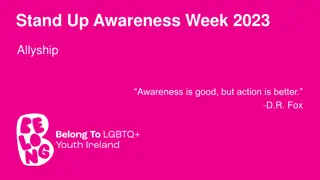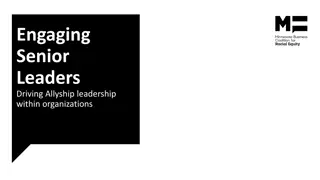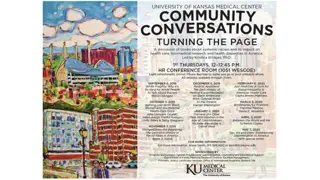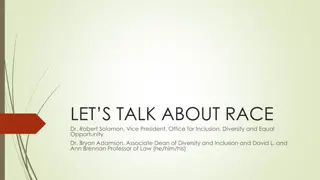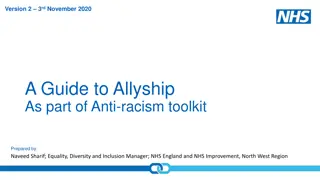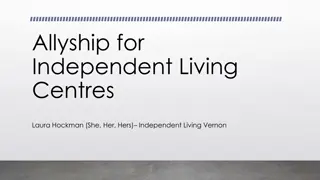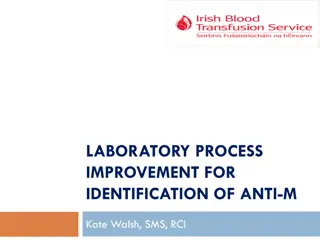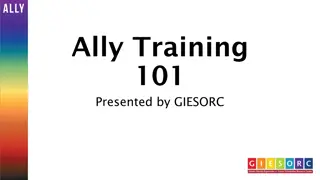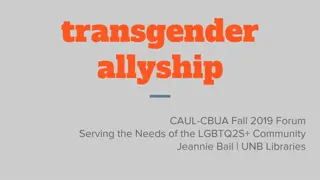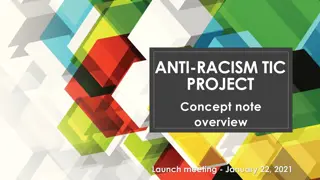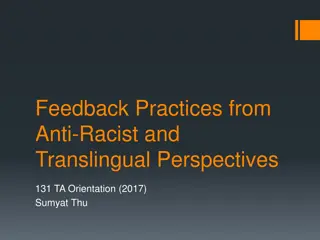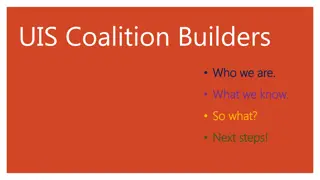Decoding Allyship: What It Means to Be an Active Anti-Racist
Being an ally involves advocating for the Black community, actively listening, unlearning inherent racism, and recognizing everyday racism. Learn how to support and uplift marginalized communities in a genuine way.
Download Presentation

Please find below an Image/Link to download the presentation.
The content on the website is provided AS IS for your information and personal use only. It may not be sold, licensed, or shared on other websites without obtaining consent from the author.If you encounter any issues during the download, it is possible that the publisher has removed the file from their server.
You are allowed to download the files provided on this website for personal or commercial use, subject to the condition that they are used lawfully. All files are the property of their respective owners.
The content on the website is provided AS IS for your information and personal use only. It may not be sold, licensed, or shared on other websites without obtaining consent from the author.
E N D
Presentation Transcript
Spiritual development: Learning from pupils in Christian-ethos secondary schools. Dr Ann Casson Senior Research Fellow National Institute for Christian Education Research
Contents Aims The research project What is spiritual development? Next steps: supporting schools ... Implications & Conclusions
The Research Project Ann Casson, Trevor Cooling, Leslie Francis, Telling the stories of 10 Christian-ethos secondary schools, to stimulate other schools to reflect on, and improve their own work of spiritual development with their students Contributing to the international academic debate on the distinctiveness and effectiveness of Christian-ethos secondary schools
Initial findings Holistic; Flexible; Adapted To School Context; Vocation; Role Models; Chaplaincy; Christian Values; Prayer; Sacred Space; Reflection Time; Emmaus Moments; Collective Worship; Sense Of Belonging; Trust; Reconciliation; Care For The Vulnerable; Made in the Image of God; Faith In Action; Live Life to the Full; Christian Service; Scriptures; Religious And Theological Concepts; Religious Education; Confidence in God. 350 pupils, 130 staff & 50 key stakeholders were interviewed & 6,538 pupils completed the Francis scale of attitude to Christianity questionnaire
God is already at work in our church schools so let s pay attention to what He s doing and unlock that.
What is spiritual development? A sense of formation, development in the spiritual dimension characterised by critical openness & critical enquiry, development within a Christian context Genesis 1:26 John 10:10
What do students understand by spiritual development? Self: fulfilling one s potential Belonging to a community Developing knowledge and understanding Making a connection to God
Young people as bricoleurs Bricolage in a fragmented world: The individual s construction of their own religious identity, from the materials available to them.
Next steps: making the patterns visible to others: Identifying ways for spiritual development to flourish in schools 1. Inclusivity 2. Staff development 3. Curriculum RE, the creative arts & sport 4. Spiritual leaders, chaplains and support staff 5. Social action - empowering students 6. Sacred space, time & texts
1. Inclusive spiritual development Looking at diverse and fragmentary identities Spiritual journeying Misunderstandings & Compromises Reflecting on how to develop an inclusive climate for spiritual development in your school
Spiritual development for all? Reflecting on the following student voices want challenges you, or concerns you? Choose 1 or 2 of the student voices. How would you respond to it?
Diversity and fragmentation I don t pray 5 times a day, I don t even pray in a mosque, but I am Muslim, just a different branch, I don t even have a headscarf, they tell you about the different branches of Christianity, but (Ahmadi Muslim student) I sort of have to be an expert in my faith here, like in RE when we did the Quran...(Muslim student) Coming here we find out more about other faiths, like Christianity, and there s various other opinions that makes us choose our own path. (Muslim student)
Christian atheist? Half my family is Christian but the other half are non- religious. So I just get Christian morals from one side of my family but other side I feel I m not actually religious and I don t believe in God I do worship here...just out of respect... A lot of people here they say that they re religious and they say that they re a Christian but you can t really tell, there s no evidence of it. you ask them if they go to church and they say no so it s difficult to tell if they actually are religious or not. In rugby, before the game, they all wanted to pray and I wouldn t
Christian morals? My immediate family are not particularly religious we consider ourselves Jewish but more by race than religion I used to go to a synagogue on Sundays when I was younger and I used to learn Hebrew and stuff but I don t really do that anymore. I still know things about my faith. I know more about Christianity because I went to a church primary school as well I find [it] quite offensive sometimes. Like especially that teacher if you do something wrong they re ok if you were a good Christian you wouldn t do that and it s just well I m not a Christian. And I think that people always associate doing good things with Christianity but you don t have to be a Christian to have good morals (Jewish student)
Spiritual journeying When I first came here I was Christian, I went to church and I just believed, my family believed in God and I believed in God But then, as it went on I did question it and different things made me feel like oh well I don t believe in God I don t know, I just felt sometimes a bit like distant, a bit odd, because I was like well He obviously doesn t care about me then and things like that. It wasn t really like that bad but I did feel like I d grown a bit further away from God. But then actually quite recently I decided I honestly don t know, whether God is real or not. I just feel like I don t know, there is so much I don t know about the world So I don t feel like I can make a decision yes or no and I feel like I am definitely agnostic. (Y11 student)
Inclusive worship I like worship, ..brings God into my day...I like to take the Eucharist because I like to follow their beliefs in school and it just makes me not look the odd one out. I quite like apart from the bread (Hindu student) Worship is about having an out of and in school connection to God obviously, for others who don t believe in God or Christianity, they still get some sort of message out of it, because it still projects out goodness into them. (student)
Questions Reflecting on the student voices want challenged you, or concerned you? Choose 1 or 2 of the student voices. How would you respond to it? Thinking Big: How should a church school address the spiritual needs of students from diverse and fragmented faith backgrounds? Starting small; What could you do in the next week/month to address this? Sustainable action: How could this be sustained or scaled up for the whole school?


